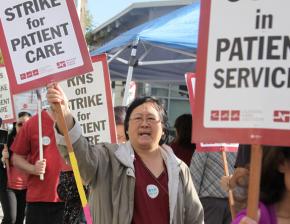Nurses seek justice at Sutter
reports on the latest walkout at a so-called "not-for-profit" hospital chain.
THE UNCHECKED greed of one of California's wealthiest hospital chains ran into an obstacle last week when more than 3,200 unionized nurses went on strike against Sutter-owned hospitals across the Bay Area. Nurses and technicians, represented by the California Nurses Association/National Nurses United, are battling a range of concessions demanded by management.
"Our contract at this hospital is 60 years old, and it's one of the best in the California health system," said Mike Hill, who has worked since 1986 as a registered nurse at Alta Bates Summit Medical Center in Oakland. "That's why management is coming after us."
Sutter's aggressive emphasis on money has helped it make more than $4 billion in profits since 2005. According to a Modern Healthcare survey, Sutter has the highest net patient revenue per employee among U.S. hospital chains. Sutter's Sacramento facility landed on Forbes list of America's Most Profitable Hospitals.
Nurses at Sutter have been forced to strike six times in the past 18 months because of management's stubbornness in demanding harsh concessions from the union. The walkout hit seven hospitals in Alameda, Contra Costa and Solano Counties, where local Sutter management refuses to compromise. Elsewhere in the state, Sutter has backed off and signed agreements after being worn down by the union's resistance to austerity.

According to the union, "Sutter continues to insist on more than 100 unwarranted reductions, such as eliminating paid sick leave, which would effectively force RNs to work when ill, dangerously exposing patients with compromised immune systems to further infection."
"We've been negotiating with them for 18 months, but they haven't bargained seriously," explained Hill as he walked the picket line. "Their attitude is take it or leave it. This is our sixth strike in that time. And now they are threatening to impose a contract on us. This includes imposing a pay scale for newly hired nurses starting at $18 an hour less than current nurses. They also want to cut our night and on-call differentials--that is, the extra pay we get for working those off-hours--from $10.13 and $12.67 an hour respectively to just $7.50 an hour."
THESE PROFITS come at a steep cost to patients. Sutter is trying to circumvent California's landmark 2004 patient-staffing ratio law by counting charge nurses who oversee care in an area towards the ratio of nurses providing actual direct patient care on the hospital floor.
"We are fighting for our patients because a bad contract will make it difficult to attract the highest-quality nurses," said Hill. "This could have an impact on the quality of care. Sutter wants to start a new HMO, and they want to compete with Kaiser, who they see as competition, but they want to compete on low costs, like Wal-Mart. The nurses are standing in their way."
Much like Kaiser, another gargantuan not-for-profit hospital chain, Sutter can't pay its profits as a dividend to investors. Excess money is supposed to be re-invested into the hospital's community health care mission, for example providing charity care. So instead, Sutter pays more than 28 executives in excess of $1 million in annual compensation.
The not-for-profit charade is a defining feature of California's health care industry, according to a report from the union's research department:
Not-for-profit tax breaks for well-known California hospitals--including Cedars Sinai, Kaiser Permanente and Stanford University--dwarf the level of charity care provided. Overall, the 196 hospitals surveyed received $3.3 billion in 2010 state and federal tax exemptions and spent only $1.4 billion on charity care--a gap of $1.8 billion. Three-quarters of the hospitals got more dollars in tax breaks than they spent on charity care.
Union nurses at Sutter hospitals will be locked-out for several days following the one-day strike as traveling replacement nurses fill their roles. During a 2011 lockout, a scab nurse at Alta Bates Summit Medical Center killed a patient through medical error.


